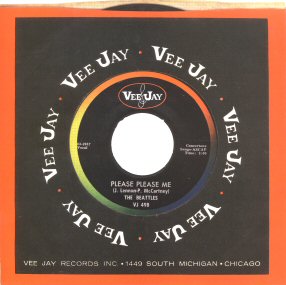 Meanwhile, the Beatles were tearing up the British charts. "Love Me Do" had been recorded in
September, 1962, a few weeks after the deal that contracted the group to Vee Jay, and had hovered in
the twenties of the English charts from November to January. The Beatles' next single, "Please Please
Me," sailed all the way to #1 by March, 1963. When it hit #2 in early February, Vee Jay decided to
release the single here, which they did in late February, 1963, as Vee Jay 498. Oddly enough, nothing at
all happened, nationally. The song did get some airplay from Chicago top-40 giant WLS, and was placed
on their top-40 charts for two weeks, making it the first local top- 40 appearance for the group in the US.
The group was such an unknown that their name was misspelled "Beattles" on the record label and the
top-40 charts.
Meanwhile, the Beatles were tearing up the British charts. "Love Me Do" had been recorded in
September, 1962, a few weeks after the deal that contracted the group to Vee Jay, and had hovered in
the twenties of the English charts from November to January. The Beatles' next single, "Please Please
Me," sailed all the way to #1 by March, 1963. When it hit #2 in early February, Vee Jay decided to
release the single here, which they did in late February, 1963, as Vee Jay 498. Oddly enough, nothing at
all happened, nationally. The song did get some airplay from Chicago top-40 giant WLS, and was placed
on their top-40 charts for two weeks, making it the first local top- 40 appearance for the group in the US.
The group was such an unknown that their name was misspelled "Beattles" on the record label and the
top-40 charts.
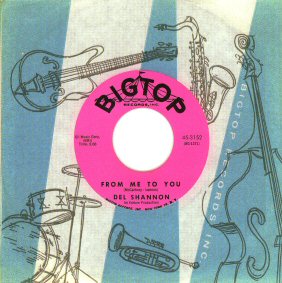 The Beatles' third British single, "From Me To You," dashed up the English charts with astonishing
speed, making #1 in only three weeks and staying there for six straight weeks. News items in the trade
magazines such as Billboard began to indicate that something was happening over there that may be
interesting. When "From Me To You" hit #1, Vee Jay again released the single over here, but this one
ran into cover record problems! Del Shannon, who by that time had had a string of U.S. hits, heard the
Beatles do "From Me To You" during an English tour, and promptly covered it for U.S. audiences. The
Shannon version sold unevenly, but the Beatles disc barely sold at all. For example, in Chicago, Vee
Jay's base of operations, the major top 40 stations, WLS and WJJD, were on the Del Shannon single,
and it easily made the top 20 there. Vee- Jay couldn't get the Beatles' version on these stations,
although the Beatles disc did get substantial airplay on some secondary Chicago top 40 stations, such
as the lesser-known WYNR. Nationwide, the airplay on the Beatles' version of "From Me To You" was
only enough to push it to #116, with this peak coming about August 10, mainly due to popularity in the
Los Angeles area. But by August 10, Vee Jay was in the middle of a major management crisis.
The Beatles' third British single, "From Me To You," dashed up the English charts with astonishing
speed, making #1 in only three weeks and staying there for six straight weeks. News items in the trade
magazines such as Billboard began to indicate that something was happening over there that may be
interesting. When "From Me To You" hit #1, Vee Jay again released the single over here, but this one
ran into cover record problems! Del Shannon, who by that time had had a string of U.S. hits, heard the
Beatles do "From Me To You" during an English tour, and promptly covered it for U.S. audiences. The
Shannon version sold unevenly, but the Beatles disc barely sold at all. For example, in Chicago, Vee
Jay's base of operations, the major top 40 stations, WLS and WJJD, were on the Del Shannon single,
and it easily made the top 20 there. Vee- Jay couldn't get the Beatles' version on these stations,
although the Beatles disc did get substantial airplay on some secondary Chicago top 40 stations, such
as the lesser-known WYNR. Nationwide, the airplay on the Beatles' version of "From Me To You" was
only enough to push it to #116, with this peak coming about August 10, mainly due to popularity in the
Los Angeles area. But by August 10, Vee Jay was in the middle of a major management crisis.
Sometime in the Spring of 1963, some odd rumors started going around within the industry that Vee Jay
was in financial trouble, and that they weren't paying the Four Seasons all of their royalties.
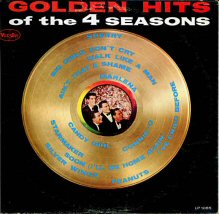 Calvin Carter: "We got into a little trouble financially because of the deal with the Four Seasons.
We were giving them 16 cents per record including publishing, so therefore we were losing two points
(1.8 cents) for every record we sold for them (normal royalties were about 14 cents). Now the first three
records sold in excess of one million each, so we got behind with them."
Calvin Carter: "We got into a little trouble financially because of the deal with the Four Seasons.
We were giving them 16 cents per record including publishing, so therefore we were losing two points
(1.8 cents) for every record we sold for them (normal royalties were about 14 cents). Now the first three
records sold in excess of one million each, so we got behind with them."
Part of the trouble was that even though Vee Jay had exploded with several million-sellers in 1962, the
company was to a large extent still being run like it had been when it was a small business. Many of the
records of receipts, money owed, etc., were being kept in Ewart Abner's head, and there was question
as to how well these records were being kept. As the Four Seasons situation became more and more
tense, the Brackens decided to make a change in management.
On August 3,1963, Billboard announced, "A major executive shakeup occurred at Vee Jay
Records this week when President Ewart Abner, Jr., public relations chief Barbara Gardner, and
promotion and A&R head Bill Sheppard, exited the firm.... James Bracken ... told Billboard that Vee Jay
had just signed Bob Crewe and the Four Seasons to a new four-year contract. 'This should indicate,
better than anything, our intentions to the future'."
Abner's departure from Vee Jay was a shock to many in the industry. Regardless of what trouble had
caused his leaving, Abner was extremely well liked by the artists, distributors, and other industry people,
and the inescapable fact was that much of Vee Jay's success was attributable to Abner's considerable
promotional talent. Abner wasted little time in setting up Dart Record Sales as an independent record
distributor, which would shortly handle Abner's new Constellation label. Bill Sheppard was appointed
Vice President, and Art Sheridan, an associate of Abner's dating back to Chance Records, was made
secretary and put in charge of Dart Industries. In the August 17, 1963, issue of Billboard, Abner
dismissed the rumors about why he had resigned from Vee Jay: "He said quitting was motivated by
policy differences and a conflict of personalities. He termed any other reason for his leaving as
'ridiculous.' He said his relations with Vee Jay executives, Jimmy and Vivian Bracken, had been and
were still amicable."
It took Vee Jay several weeks to name a new president, and during this interim period, several critical
events took place which would affect the company's future. First, since Gene Chandler and the
Sheppards were contracted to Bill Sheppard and not to Vee Jay, both artists left the label to go to
Constellation. About this time, Dee Clark also left Vee Jay and joined Abner. In the confusion, EMI asked
for a release on Frank Ifield:
Calvin Carter: "When we got into a little financial trouble with the Four Seasons, the word
passed through the grapevine in the industry that we were in trouble, and EMI asked for a release on the
Frank Ifield contract. So we granted their release."
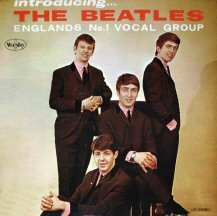 This release was apparently granted on August 8, 1963. At that time the new Frank Ifield single was set
to be released, and it first came out as Vee Jay 2674 according to a Billboard review on August 17, with
the coupling "I'm Confessin' That I Love You"/"Heart And Soul." (This is a very odd Vee Jay number and
may be a misprint.) A week later, EMI had announced that it had given the disc to Vee Jay by mistake,
and that the record would actually be on Capitol 5032: "I'm Confessin'"/"Waltzin' Matilda." But the Frank
Ifield departure had larger implications.
This release was apparently granted on August 8, 1963. At that time the new Frank Ifield single was set
to be released, and it first came out as Vee Jay 2674 according to a Billboard review on August 17, with
the coupling "I'm Confessin' That I Love You"/"Heart And Soul." (This is a very odd Vee Jay number and
may be a misprint.) A week later, EMI had announced that it had given the disc to Vee Jay by mistake,
and that the record would actually be on Capitol 5032: "I'm Confessin'"/"Waltzin' Matilda." But the Frank
Ifield departure had larger implications.
Calvin Carter: "During that time, Ewart Abner left the company and we brought a new
management team in, and they were at first under the impression that we had also released the Beatles.
But we didn't. EMI claimed they sent us some kind of mysterious telegram, but they never could find the
telegram. We were also set to release an album by the Beatles about that time (Introducing The
Beatles, Vee- Jay LP/SR-1062), but we had too many items in our catalog already, and the
distributors were complaining. So we eliminated some of these albums we were set to release, and the
Beatles album was one of them, because the Beatles just did not sell very well the first time around. I
kept the Beatles album in my desk drawer for several months after that."
The last minute cancellation of several albums in the new Fall catalog just added to the general
confusion at Vee Jay during that period. (Albums LP/SR-1063 and -1064 were undoubtedly also
cancelled at this time.) For two weeks in a row in August, Vee Jay ran ads that promised that next week
they would unveil their new Fall catalog. It never came.
The other significant event which occurred during the weeks between Vee Jay presidents was that the
Four Seasons situation blew up. New contract or no new contract, on August 13, the Four Seasons filed
suit against Genius, Inc., the production firm headed by Bob Crewe, for Vee Jay's nonpayment of
royalties. (The Four Seasons were technically not under contract to Vee Jay, but to Genius, Inc. Crewe's
company had the contract with Vee Jay, so the group had to sue Crewe and Crewe had to sue the
label.) Crewe's firm served notice on Vee Jay that they considered their contract to be void due to Vee
Jay's not paying full royalties. This legal maneuvering went on until November, when it became obvious
that the Four Seasons had already finished their new single, "Dawn (Go Away)," but were refusing to
give it to Vee Jay, at which point Vee Jay countersued.
It was amidst this near chaos that Randy Wood was named President of Vee Jay Records the last week
in August, 1963. Wood had been with Vee Jay since 1960, and had been a substantial force in the
label's increased sales over 1960-63. Wood was to continue this excellent sales track record while he
remained president of Vee Jay. Shortly thereafter, Jay Lasker was named Executive Vice-President,
Calvin Carter was named Vice President in charge of A&R and Publishing, Steve Clark was named Vice
President in charge of Sales, and Mark (Manny) Sands named Comptroller. This cast became the new
"Executive Management Team" for Vee Jay, a new corporate structure hired to put Vee Jay more along
the lines of a large record company, which it had obviously become.
The management team had their work cut out for them. For the first time, Vee Jay was involved in a
great number of lawsuits. This legal tangle increased by early 1964 with the Beatles actions. Randy
Wood later said, "At one point, we had no fewer than sixty- four legal actions going. It's frightening to
think about it even now." In spite of all the transactions at the corporate level, the music continued:
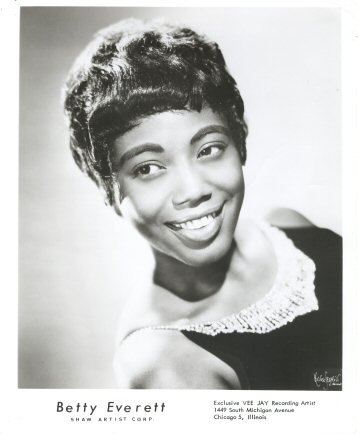 Calvin Carter: "Betty Everett came to me in 1963, and she had this magnificent voice, so I went
to New York and got some tunes. I got a song called 'The Prince of Players' and recorded her with that
and nothing happened. Then I went back to New York and got a tune called 'You're No Good.' When I
first selected the tune, I selected it for Dee Clark. Then when I went to rehearsal with the tune, it was so
negative, I said, 'Hey, guys don't talk negative about girls, because girls are the record buyers. No, I
better pass on that.' So I gave the song to Betty Everett. Then we go into the studio and we're recording
it, and the Dells were just sitting in on the recording date. They were sitting on the wooden platform
where the string players would sit. Well, they were sitting there on the playback and just stomping their
feet on this wooden platform to the beat of the song as it was playing back. So the mikes were open and
I heard it. I told the engineer 'Let's do it again, and let's mike those foot sounds, 'cause it really gave it a
hell of a beat.' So we did that, and boom, a hit. Betty Everett, with the Dells on feet. That's how things
would happen in those days, you know, by accident. You kept the mikes open and your ears all over the
place, and when anything unusual happened, you'd just tape it."
Calvin Carter: "Betty Everett came to me in 1963, and she had this magnificent voice, so I went
to New York and got some tunes. I got a song called 'The Prince of Players' and recorded her with that
and nothing happened. Then I went back to New York and got a tune called 'You're No Good.' When I
first selected the tune, I selected it for Dee Clark. Then when I went to rehearsal with the tune, it was so
negative, I said, 'Hey, guys don't talk negative about girls, because girls are the record buyers. No, I
better pass on that.' So I gave the song to Betty Everett. Then we go into the studio and we're recording
it, and the Dells were just sitting in on the recording date. They were sitting on the wooden platform
where the string players would sit. Well, they were sitting there on the playback and just stomping their
feet on this wooden platform to the beat of the song as it was playing back. So the mikes were open and
I heard it. I told the engineer 'Let's do it again, and let's mike those foot sounds, 'cause it really gave it a
hell of a beat.' So we did that, and boom, a hit. Betty Everett, with the Dells on feet. That's how things
would happen in those days, you know, by accident. You kept the mikes open and your ears all over the
place, and when anything unusual happened, you'd just tape it."
In late 1963, Capitol Records began a huge promotional campaign on the Beatles, and a new release, "I
Want To Hold Your Hand"/"l Saw Her Standing There." The latter song was one already in possession of
Vee Jay, since it was on the album nearly released the previous summer. The new Vee Jay
management team took a closer look at the contract arrangements, and were soon convinced that the
label had not released the group the previous summer. Consequently, they took the album out and sent
it to the pressing plants and prepared for some sales. They also dusted off "Please Please Me" and
"From Me To You" and paired them on a new single, Vee Jay 581. Capitol was not amused, and on
January 15, 1964, hit Vee Jay with an injunction against manufacturing, distributing, advertising, or
otherwise disposing of records by the Beatles. And the legal chase began:
Calvin Carter: "We put the album out, and EMI, through Capitol, sued us to cease and desist.
They got an injunction against us seemingly every week. They would get an injunction against us on
Monday, and we would get it off on Friday, then we'd press over the weekend and ship on Monday; we
were smooth, we had everybody alerted, and we were pressing records all the time on the weekends."
Capitol contended in the suit that Vee Jay's rights to the Beatles had been canceled on August 8, 1963,
for nonpayment of royalties.
Calvin Carter: "They were trying to get us on something really minor like failure to declare
royalties on 500 records we shipped in 1963. But that was not true at all."
A second injunction was granted against Vee Jay concerning the publishing rights on "Love Me Do" and
"P.S., I Love You," two of the tunes on the album. By mid-February, Vee Jay had won the first round with
Capitol, whereby they were allowed to press and distribute the Beatles single. The block remained
against the album, so Vee Jay took off the two cuts in question and substituted "Please Please Me" and
"Ask Me Why" instead. The album was now legally clear, and Vee Jay shipped enormous quantities of it
in a very short time. By April, it was #2 on the LP charts. The legal battle between Vee Jay and Capitol
was finally settled out of court on April 9, 1964, where "Vee Jay accepts a licence from Capitol to sell its
product, with Vee Jay paying Capitol royalties, including substantial payment for the Beatles royalties to
date and a licensing fee for the future. Neither side conceded the position of the other was right.
Calvin Carter: "We finally made something out of the court settlement, because we just couldn't
afford to fight that big a company. We kept what we had, and they had all future product. We were
selling so many Beatles records, we just couldn't afford to fight for the five-year rights. At that point, we
had even got a ten-year moratorium from our creditors on our outstanding bills, that we'd just keep them
coming. There was a lot of pressure on us. We sold in one month's time about 2.6 million Beatles
singles on Vee Jay and Tollie. Those were fantastic times. And right in the middle of this, we moved
from Chicago to California. What a mess, what a mess."
The move to California was made necessary because except for Calvin Carter, the other members of
the management team were all in Los Angeles.
Betty Chiappetta: "Vee Jay started the Tollie label when they moved to California, with ‘Twist
and Shout' by the Beatles as the first record issued. The reason that they started this new label was that
they had so many records that were getting airplay during that time that the radio stations were giving
them a hard time. At one point, they had 14 of the top 100 on either Tollie or Vee Jay. So they started
another label."
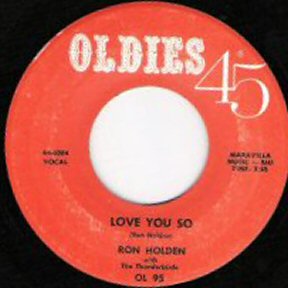 Tollie became just another in a growing family of Vee Jay related labels. In 1963, Vee Jay had begun
distributing Horizon and FM, two West Coast folk-oriented labels, and had even before that worked out a
deal with Johnny Vincent to distribute the Ace label out of Jackson, MS. In 1963 Vee Jay had started the
Oldies-45 and Oldies-33 labels, a new concept for merchandising "oldies but goodies." And in the
Summer of 1964, they would start the Interphon label as a vehicle for masters leased from Europe,
starting a division within the company called Vee Jay International. Expansion, expansion, expansion.
Tollie became just another in a growing family of Vee Jay related labels. In 1963, Vee Jay had begun
distributing Horizon and FM, two West Coast folk-oriented labels, and had even before that worked out a
deal with Johnny Vincent to distribute the Ace label out of Jackson, MS. In 1963 Vee Jay had started the
Oldies-45 and Oldies-33 labels, a new concept for merchandising "oldies but goodies." And in the
Summer of 1964, they would start the Interphon label as a vehicle for masters leased from Europe,
starting a division within the company called Vee Jay International. Expansion, expansion, expansion.
Calvin Carter: "Everybody opened their own store when they got in there. We got the Beatles,
and went from 15 or 20 employees to like 200 overnight. The growth was just too fast. Everybody in
there had a store of their own, there were lease cars all over the place, and it was just a bad job of
managing. After we got the Beatles, they came up with a bright idea and all started trying to be grabbing
stock. It was a Marx Brothers movie."
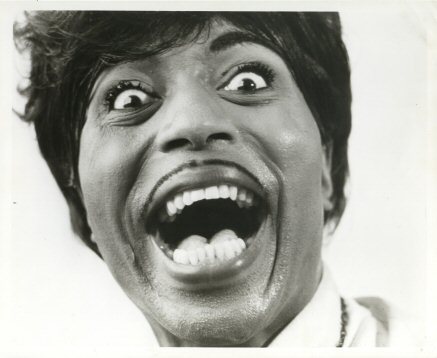 Vee-Jay signed Little Richard, freshly back from his fling with gospel music. Vee-Jay had Richard
re-record an album of his Specialty hits, which were somewhat different from the originals, but not
different enough to call attention to them for radio programmers, who still to this day play these bogus
versions on oldies shows. Vee-Jay was eventually able to put Little Richard back on the charts in
September, 1964, with a remake of Jerry Lee Lewis' "Whole Lotta Shakin' Goin' On" [Vee-Jay 612, #42
R&B]. In late 1965, Richard finally made it back on the pop charts (barely) with the Don Covay song "I
Don't Know What You've Got But It's Got Me, Part 1" (Vee-Jay 698, #92, #12 R&B).
Vee-Jay signed Little Richard, freshly back from his fling with gospel music. Vee-Jay had Richard
re-record an album of his Specialty hits, which were somewhat different from the originals, but not
different enough to call attention to them for radio programmers, who still to this day play these bogus
versions on oldies shows. Vee-Jay was eventually able to put Little Richard back on the charts in
September, 1964, with a remake of Jerry Lee Lewis' "Whole Lotta Shakin' Goin' On" [Vee-Jay 612, #42
R&B]. In late 1965, Richard finally made it back on the pop charts (barely) with the Don Covay song "I
Don't Know What You've Got But It's Got Me, Part 1" (Vee-Jay 698, #92, #12 R&B).
And Vee Jay lost the Four Seasons eventually, also, to a settlement similar to the one with the Beatles:
Vee Jay retains the masters they have, and Mercury/Phillips gets future product. Part of the settlement
was that the Four Seasons would provide one additional album to Vee-Jay, which turned out to be Vee-
Jay VJS-1154, the last album issued before the demise of the label. The loss of both groups
within a few months did enormous damage to the company's prestige. Things seemed to be working out
financially, however, with agreements being made with creditors, the government, and Capitol to spread
Vee Jay's debt out over a considerable period of time. What wasn't working out was the personalities
involved.
The company had literally split into two factions. The Brackens and Calvin Carter were in Chicago, with
the remainder of the company in Los Angeles.
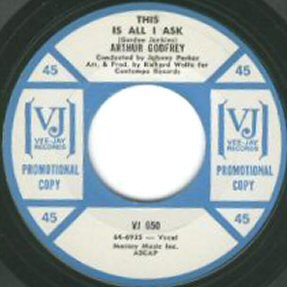 Calvin Carter: "I was in Chicago, and I didn't have too much of a working relationship with the
California office. I stayed in Chicago and tried to keep that alive, because it seemed to me to be the best
thing to do. We were making money, and all they were doing out there was blowing it. You know, we had
a little friendly war going on about that. Because it's impossible, I thought, to have the blues on the golf
course. (Laughs.) A lot of things that happened during that time were conceived out in California, like
signing Arthur Godfrey."
Calvin Carter: "I was in Chicago, and I didn't have too much of a working relationship with the
California office. I stayed in Chicago and tried to keep that alive, because it seemed to me to be the best
thing to do. We were making money, and all they were doing out there was blowing it. You know, we had
a little friendly war going on about that. Because it's impossible, I thought, to have the blues on the golf
course. (Laughs.) A lot of things that happened during that time were conceived out in California, like
signing Arthur Godfrey."
MC: Arthur Godfrey was on Vee Jay??
Calvin Carter: (Laughs.) "Yeah, we signed Arthur Godfrey. We put out one record on him I
think, and sold one copy. He bought one, I think."
According to others, the "war" was not very friendly, and not even limited to Chicago vs. Los Angeles.
Enormous friction built up between the Brackens and the management team, and among the members
of the management team itself. And this war was hardly a well guarded secret within the industry,
lowering the label's prestige even more. Talented artists who might have signed or stayed with the label
in better times now had second thoughts. Johnny Rivers, for example, was reportedly counseled not to
sign with the label by a relative who was in the company, because in good conscience he didn't want
Johnny to enter the battle zone. Billy Joe Royal's "Down In The Boondocks" slipped away. Mac Davis
slipped away.
There are several sides to this story, however. In Arnold Shaw's book Honkers And Shouters,
Randy Wood levels several blasts at the Chicago contingent for generating much of the bad will.
Certainly, the management team was making progress in getting Vee Jay on the road to financial
recovery; in the year 1964 Vee Jay did fifteen million dollars worth of business. But the price Vivian
Carter and Jimmy Bracken paid for running the family business like a corporation was that they had very
little control of the company. In early 1965, the frustration became unbearable, and Jimmy Bracken
bought out all of the West Coast management team except Randy Wood. Wood was sent packing in
June. Upon Wood's departure, Jimmy Bracken announced that he had rehired Ewart Abner to be
General Manager.
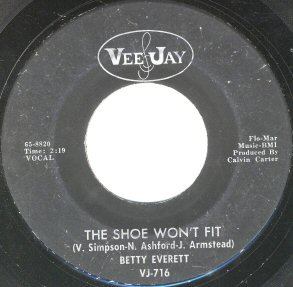
A return to the uncomplicated days of a family-owned record label, where the owners had some say in
the way things were to be run, without the mind-boggling tangle of lawyers and corporations? Perhaps. It
seemed that before Abner was brought back, Vee Jay's prestige was at such a low point that whenever
an item made the news, it was likely that a spokesman was defending the company. With Abner's
return, many of the aspects of the company returned to the way they were before all the gold records
and expansion. Tollie was absorbed back into the parent company; Interphon was discontinued
altogether. The Vee Jay logo reverted back to the oval of 1959-63, but in an obvious cost-cutting move,
in stark black with silver print, without the rainbow band around the edge of the label. The company went
back to concentrating on R&B records. And in October, 1965, the company headquarters moved back to
Chicago. Vee Jay was getting smaller and smaller.
Calvin Carter: "They moved the company back to Chicago overnight, and had everybody talking
about that. How one day we were in business on Santa Monica, had a suite of offices, and the next day,
nothing. Not even the desks were left."
The move was so quick that not even the artists were notified. Hoyt Axton reportedly said in a later
interview that he walked down to the Vee Jay offices one day and they were gone, much to his
amazement.
Some of the financial institutions reacted negatively to this attempt to go back to less troubled times, and
added to the company's financial troubles by cutting off further credit. 1965 was not a good year for Vee
Jay, as artists were leaving the label and it was obvious that the big hits had stopped coming. The label
did post several records to the top 20 of the R&B charts, but gone were the days of million sellers and
number one records.
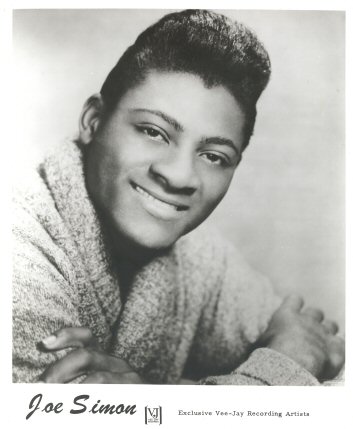 By early 1966, most of the artists had left the label, including future soul star Joe Simon, and they were
down to a nucleus of about a half-dozen acts. One of these was Jerry Butler, who throughout the years
had been the longest lasting big-name act Vee Jay had.
By early 1966, most of the artists had left the label, including future soul star Joe Simon, and they were
down to a nucleus of about a half-dozen acts. One of these was Jerry Butler, who throughout the years
had been the longest lasting big-name act Vee Jay had.
Calvin Carter: "Abner sent Jerry to New York to record an updated version of ‘For Your
Precious Love' with Clyde Otis. This was a soul version quite a bit different from the original."
Ironically, "For Your Precious Love" was the last single that Vee Jay would ever have on the charts. In
January, 1966, Randy Wood sued the company for breach of contract about the same time that the
company filed for reorganization under Chapter 11 of the bankruptcy laws. By May, 1966, for practical
purposes it was all over, as Vee Jay closed its Chicago offices and released all its employees. Jerry
Butler's contract expired May 31, and he signed with Mercury. The court hearing to decide whether the
company would be sold or declared formally bankrupt was held on August 1. In the August 13, 1966
edition of Billboard, a small item on an inner page read, "Curtain Down on Vee Jay as Liquidation is
Ordered."
Sam Weiss summed it up fairly well: "Vee Jay came the closest to being the number one black-owned
pop label. They had the Beatles before Capitol. They had the Four Seasons. They penetrated the white
market like a cannonball going through butter. Had they overcome the family and financial problems that
ultimately destroyed them, they could have become as big as Motown. They started as a rhythm and
blues label, but they had the makings of a big, big major label."
But perhaps Randy Wood said it best: "It's sad to think what it could have been."
Epilogue
Many of the Vee-Jay artists continued with successful careers, both as recording artists and outside the
music business. Jerry Butler switched to Mercury in 1966 and continued having hits into the 1970s. He
eventually became the host of several television specials covering early doo-wop music, and had a
second career in politics in the Chicago area. Gene Chandler, who went to Constellation with Ewart
Abner in 1963, had several hits with that label, and Chandler had subsequent success with Brunswick
and Mercury, most notably the 1970 hit "Groovy Situation." He went on to become a record label owner.
Frank Ifield had several country chart records in the late 1960s, and his Slim-Whitman-soundalike style
was popular in England. James "Red" Holloway became musical director of the Parisian Room in Los
Angeles in the 1980s. As of December, 2006, he was still performing in the Seattle area. The Four
Seasons and Beatles need no explanation.
But as the music business is a tough business for one's health, many died relatively young. Curtis
Mayfield (born June 3, 1942 in Chicago), who sang and played guitar on several hits with Jerry Butler,
went on to become a superstar, first with his Impressions on ABC Records, then as a solo artist. He died
on December 26, 1999. The Dells hit big with "There Is" in 1968 and had a string of hits for the Cadet
label in the 1960s and 1970s. Lead singer Johnny Funches died on January 23, 1998. Wade Flemons,
who went on to sing with Earth, Wind and Fire for a short time, died of cancer on October 13, 1993. Hoyt
Axton subsequently recorded for Capitol, Columbia, MCA, his own Jeremiah record label, and a couple
of other labels, establishing himself as a country music star ("Della and the Dealer," "Boney Fingers")
and actor ("The Black Stallion") in the 1980s. Hoyt Axton died on October 26, 1999. Guitarist Leroy
"Lefty" Bates (born May 7, 1924) became leader of the Ink Spots in the 1970s. He died in Indianapolis
on March 2, 1991.
The Staple Singers continued to record gospel music and by the 1970s were also hitting it big in the soul
market (for Stax Records) with such hits as "Respect Yourself." Roebuck "Pop" Staples died on
December 19, 2000.
Jimmy Reed recorded for several labels after Vee-Jay, most notably ABC's Bluesway subsidiary in the
late 1960s. He died of an epileptic seizure on August 29, 1976. John Lee Hooker continued recording
his inimitable blues style for the next few decades, including a hit album with Canned Heat. He died on
June 21, 2001. Dee Clark, who went to Constellation in 1963, had several chart records on that label. He
died of a heart attack on December 7, 1990. Jay McShann, who continued as a successful bandleader
after his hit "Hands Off," died in December, 2006. Betty Everett (born November 23, 1939), went on to
record hits for other labels, including Uni. She died of a heart attack on August 19, 2001.
Jimmy Bracken died on February 22, 1972, in Los Angeles. Vivian Carter returned to Gary, where she
was active in radio well into the 1980s. She died in Gary, Indiana, on June 12, 1989. Calvin Carter was
active in production until the 1980s; he died in Gary, Indiana, on July 9, 1986. Ewart Abner became
President of Motown, and later became Stevie Wonder's manager. Ewart Abner died on December 27,
1997 in Los Angeles. Randy Wood (born October 10, 1929 in New York), who along with Betty Chiapetta
bought Vee-Jay out of bankruptcy in 1967, died October 10, 1980 in Los Angeles.
Sid McCoy remained in radio, with syndicated shows, and branched out into acting, as well as becoming
the announcer for the Soul Train television show. Bill "Bunky" Sheppard (born March 20, 1922)
later founded the Bunky label, which had the hits "Get On Up" and "And Get Away" by the Esquires, and
later became a producer for 20th Century Fox Records. Sheppard was still engaged in independent
record work when he died on July 1, 1997, in Los Angeles. The late Jay Lasker became president of
ABC Dunhill.
In the 1980s, Chiapetta leased some of the rights to Chameleon in Chicago, who issued some poor
quality CDs. Chiapetta later sold Vee-Jay to a Limited Partnership headed by Daniel Pritzker, who was
also the head of Chameleon Records, who began issuing much higher quality CDs, first under the Vee-
Jay/Chameleon label in 1991, then under the Vee-Jay logo in 1992-1993. The Vee-Jay Limited
Partnership went temporarily inactive in early 1994.
Since then, much of the jazz material has been issued on the Japanese Fresh Sound/Vee-Jay label on
CD from 1996-99. In 1999, Vee-Jay Limited Partnership was reactivated under Michelle Tayler
Management, first in the label's original home town of Chicago, then in Connecticut. Similar to Betty
Chiapetta and Randy Wood's original intent with the label they bought from bankruptcy in 1967, the
current (fourth) configuration of Vee-Jay is basically a "holding company". They will license their
masters, but do not plan any new CD products from the Vee-Jay imprint itself. By 2001, Rhino had
sub-leased lots of the Vee-Jay catalog to Collectables, who had issued over 100 CDs from the Vee-Jay
masters. They have also licensed single tracks to Ace (UK), BMG, Capitol, Disky (Holland), EMI, Hip-O,
House of Blues, NBC. Readers Digest (UK), Sony (France), Time-Life, Universal, Varese Sarabande,
and Warner Brothers, as well as their catalog licenses to Rhino, Charly (UK), and others. Vee-jay tracks
have also appeared in dozens of films and television shows.
Acknowledgments:
Both Calvin Carter and Betty Chiapetta spent many hours on the phone with me, and they are due
special thanks. Thanks also go to those who took time from their busy schedules to talk: Sid McCoy,
Red Holloway, Lefty Bates, and Bill Sheppard. Additional thanks for help in research or the discography
go to Foote Kirkpatrick, Robert Pruter, Wes Smith, Dick Lillard, Bud Buschardt, Steve Goddard, Jim
Harkey, Ed Chaplin, George Ferguson, Jeff Levine, Ned Stacey, Robert L. Campbell, and David
Edwards.
We would appreciate any additions or corrections to this story. Just send them to us via e-mail. Both Sides Now Publications is an
information web page. We are not a catalog, nor can we provide the records mentioned below. We have
no association with Vee-Jay Records, which is currently inactive. Should you be interested in acquiring
Vee-Jay products (which are all out of print), we suggest you see our Frequently Asked Questions page and Follow the
instructions found there. This story and discography are copyright 1981, 1993, 1997, 1999, 2006 by Mike
Callahan. All rights reserved.
The Vee-Jay Story (with the Vee-Jay International Story and Discography) was originally published in the
May, 1981, issue of Goldmine. The Vee-Jay Story was reprinted in a somewhat edited form as
the liner notes for the 1993 box set The Vee- Jay Story: Celebrating 40 Years of Classic Hits
1953-1993 [Vee-Jay NVS2-400].
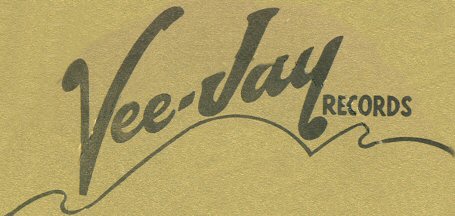 Back to the Vee-Jay Main Page
Back to the Vee-Jay Main Page
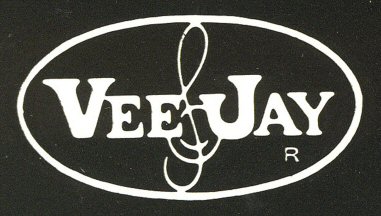 Back to The Vee-Jay Story, Page 2
Back to The Vee-Jay Story, Page 2
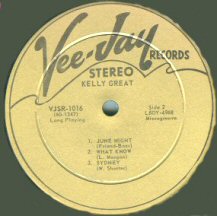 On to The Vee-Jay Story, Page 4
On to The Vee-Jay Story, Page 4
 Back to the Discography Listings Page
Back to the Discography Listings Page
 Back to the Both Sides Now Home Page
Back to the Both Sides Now Home Page
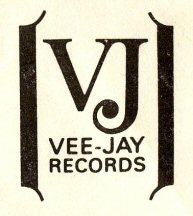 The Vee-Jay Story, Page 3
The Vee-Jay Story, Page 3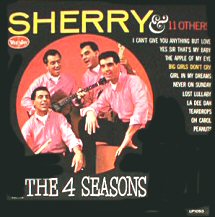 Vee Jay had another record out a few months later with a twist lyric of sorts. Remember the line, "Why
don't you come out, to my twist party?"
Vee Jay had another record out a few months later with a twist lyric of sorts. Remember the line, "Why
don't you come out, to my twist party?"
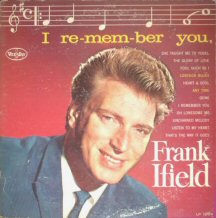 By mid-1962, just after "Sherry" had hit, Vee Jay was being noticed as a potent force within the record
industry. EMI, the British record company with ties to the U.S. Capitol label, approached Vee Jay in
Summer 1962 after Capitol had used their right of first refusal to turn down a couple of artists EMI had
offered. Capitol's refusal, in retrospect, ranks fairly high on the list of all-time record industry blunders:
By mid-1962, just after "Sherry" had hit, Vee Jay was being noticed as a potent force within the record
industry. EMI, the British record company with ties to the U.S. Capitol label, approached Vee Jay in
Summer 1962 after Capitol had used their right of first refusal to turn down a couple of artists EMI had
offered. Capitol's refusal, in retrospect, ranks fairly high on the list of all-time record industry blunders:
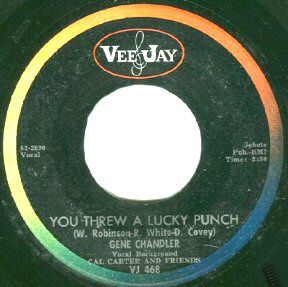 In the first six months of 1963, two of Vee Jay's releases were strong enough to become two-sided hits.
Gene Chandler's late 1962 disc, "You Threw A Lucky Punch," was an answer song to Mary Wells'
Motown hit "You Beat Me To The Punch," and continued Chandler's string of novelty songs and
lightweights. Wanting to get out of this straightjacket and to start building a reputation as a serious
singer, Gene spent considerable time and effort trying to persuade deejays to turn the record over and
play the soulful ballad on the flip, "Rainbow." This finally paid off, and in early 1963 "Rainbow" became a
sizeable R&B hit. The Four Seasons' spring release, "Ain't That A Shame"/ "Soon (I'll Be Home Again)"
(Vee Jay 512), also saw both sides get airplay.
In May, Vee Jay released "Spring," a solid R&B hit for a group with the unlikely name of Birdlegs and
Pauline.
In the first six months of 1963, two of Vee Jay's releases were strong enough to become two-sided hits.
Gene Chandler's late 1962 disc, "You Threw A Lucky Punch," was an answer song to Mary Wells'
Motown hit "You Beat Me To The Punch," and continued Chandler's string of novelty songs and
lightweights. Wanting to get out of this straightjacket and to start building a reputation as a serious
singer, Gene spent considerable time and effort trying to persuade deejays to turn the record over and
play the soulful ballad on the flip, "Rainbow." This finally paid off, and in early 1963 "Rainbow" became a
sizeable R&B hit. The Four Seasons' spring release, "Ain't That A Shame"/ "Soon (I'll Be Home Again)"
(Vee Jay 512), also saw both sides get airplay.
In May, Vee Jay released "Spring," a solid R&B hit for a group with the unlikely name of Birdlegs and
Pauline.
 Meanwhile, the Beatles were tearing up the British charts. "Love Me Do" had been recorded in
September, 1962, a few weeks after the deal that contracted the group to Vee Jay, and had hovered in
the twenties of the English charts from November to January. The Beatles' next single, "Please Please
Me," sailed all the way to #1 by March, 1963. When it hit #2 in early February, Vee Jay decided to
release the single here, which they did in late February, 1963, as Vee Jay 498. Oddly enough, nothing at
all happened, nationally. The song did get some airplay from Chicago top-40 giant WLS, and was placed
on their top-40 charts for two weeks, making it the first local top- 40 appearance for the group in the US.
The group was such an unknown that their name was misspelled "Beattles" on the record label and the
top-40 charts.
Meanwhile, the Beatles were tearing up the British charts. "Love Me Do" had been recorded in
September, 1962, a few weeks after the deal that contracted the group to Vee Jay, and had hovered in
the twenties of the English charts from November to January. The Beatles' next single, "Please Please
Me," sailed all the way to #1 by March, 1963. When it hit #2 in early February, Vee Jay decided to
release the single here, which they did in late February, 1963, as Vee Jay 498. Oddly enough, nothing at
all happened, nationally. The song did get some airplay from Chicago top-40 giant WLS, and was placed
on their top-40 charts for two weeks, making it the first local top- 40 appearance for the group in the US.
The group was such an unknown that their name was misspelled "Beattles" on the record label and the
top-40 charts.
 The Beatles' third British single, "From Me To You," dashed up the English charts with astonishing
speed, making #1 in only three weeks and staying there for six straight weeks. News items in the trade
magazines such as Billboard began to indicate that something was happening over there that may be
interesting. When "From Me To You" hit #1, Vee Jay again released the single over here, but this one
ran into cover record problems! Del Shannon, who by that time had had a string of U.S. hits, heard the
Beatles do "From Me To You" during an English tour, and promptly covered it for U.S. audiences. The
Shannon version sold unevenly, but the Beatles disc barely sold at all. For example, in Chicago, Vee
Jay's base of operations, the major top 40 stations, WLS and WJJD, were on the Del Shannon single,
and it easily made the top 20 there. Vee- Jay couldn't get the Beatles' version on these stations,
although the Beatles disc did get substantial airplay on some secondary Chicago top 40 stations, such
as the lesser-known WYNR. Nationwide, the airplay on the Beatles' version of "From Me To You" was
only enough to push it to #116, with this peak coming about August 10, mainly due to popularity in the
Los Angeles area. But by August 10, Vee Jay was in the middle of a major management crisis.
The Beatles' third British single, "From Me To You," dashed up the English charts with astonishing
speed, making #1 in only three weeks and staying there for six straight weeks. News items in the trade
magazines such as Billboard began to indicate that something was happening over there that may be
interesting. When "From Me To You" hit #1, Vee Jay again released the single over here, but this one
ran into cover record problems! Del Shannon, who by that time had had a string of U.S. hits, heard the
Beatles do "From Me To You" during an English tour, and promptly covered it for U.S. audiences. The
Shannon version sold unevenly, but the Beatles disc barely sold at all. For example, in Chicago, Vee
Jay's base of operations, the major top 40 stations, WLS and WJJD, were on the Del Shannon single,
and it easily made the top 20 there. Vee- Jay couldn't get the Beatles' version on these stations,
although the Beatles disc did get substantial airplay on some secondary Chicago top 40 stations, such
as the lesser-known WYNR. Nationwide, the airplay on the Beatles' version of "From Me To You" was
only enough to push it to #116, with this peak coming about August 10, mainly due to popularity in the
Los Angeles area. But by August 10, Vee Jay was in the middle of a major management crisis.
 Calvin Carter: "We got into a little trouble financially because of the deal with the Four Seasons.
We were giving them 16 cents per record including publishing, so therefore we were losing two points
(1.8 cents) for every record we sold for them (normal royalties were about 14 cents). Now the first three
records sold in excess of one million each, so we got behind with them."
Calvin Carter: "We got into a little trouble financially because of the deal with the Four Seasons.
We were giving them 16 cents per record including publishing, so therefore we were losing two points
(1.8 cents) for every record we sold for them (normal royalties were about 14 cents). Now the first three
records sold in excess of one million each, so we got behind with them."
 This release was apparently granted on August 8, 1963. At that time the new Frank Ifield single was set
to be released, and it first came out as Vee Jay 2674 according to a Billboard review on August 17, with
the coupling "I'm Confessin' That I Love You"/"Heart And Soul." (This is a very odd Vee Jay number and
may be a misprint.) A week later, EMI had announced that it had given the disc to Vee Jay by mistake,
and that the record would actually be on Capitol 5032: "I'm Confessin'"/"Waltzin' Matilda." But the Frank
Ifield departure had larger implications.
This release was apparently granted on August 8, 1963. At that time the new Frank Ifield single was set
to be released, and it first came out as Vee Jay 2674 according to a Billboard review on August 17, with
the coupling "I'm Confessin' That I Love You"/"Heart And Soul." (This is a very odd Vee Jay number and
may be a misprint.) A week later, EMI had announced that it had given the disc to Vee Jay by mistake,
and that the record would actually be on Capitol 5032: "I'm Confessin'"/"Waltzin' Matilda." But the Frank
Ifield departure had larger implications.
 Calvin Carter: "Betty Everett came to me in 1963, and she had this magnificent voice, so I went
to New York and got some tunes. I got a song called 'The Prince of Players' and recorded her with that
and nothing happened. Then I went back to New York and got a tune called 'You're No Good.' When I
first selected the tune, I selected it for Dee Clark. Then when I went to rehearsal with the tune, it was so
negative, I said, 'Hey, guys don't talk negative about girls, because girls are the record buyers. No, I
better pass on that.' So I gave the song to Betty Everett. Then we go into the studio and we're recording
it, and the Dells were just sitting in on the recording date. They were sitting on the wooden platform
where the string players would sit. Well, they were sitting there on the playback and just stomping their
feet on this wooden platform to the beat of the song as it was playing back. So the mikes were open and
I heard it. I told the engineer 'Let's do it again, and let's mike those foot sounds, 'cause it really gave it a
hell of a beat.' So we did that, and boom, a hit. Betty Everett, with the Dells on feet. That's how things
would happen in those days, you know, by accident. You kept the mikes open and your ears all over the
place, and when anything unusual happened, you'd just tape it."
Calvin Carter: "Betty Everett came to me in 1963, and she had this magnificent voice, so I went
to New York and got some tunes. I got a song called 'The Prince of Players' and recorded her with that
and nothing happened. Then I went back to New York and got a tune called 'You're No Good.' When I
first selected the tune, I selected it for Dee Clark. Then when I went to rehearsal with the tune, it was so
negative, I said, 'Hey, guys don't talk negative about girls, because girls are the record buyers. No, I
better pass on that.' So I gave the song to Betty Everett. Then we go into the studio and we're recording
it, and the Dells were just sitting in on the recording date. They were sitting on the wooden platform
where the string players would sit. Well, they were sitting there on the playback and just stomping their
feet on this wooden platform to the beat of the song as it was playing back. So the mikes were open and
I heard it. I told the engineer 'Let's do it again, and let's mike those foot sounds, 'cause it really gave it a
hell of a beat.' So we did that, and boom, a hit. Betty Everett, with the Dells on feet. That's how things
would happen in those days, you know, by accident. You kept the mikes open and your ears all over the
place, and when anything unusual happened, you'd just tape it."
 Tollie became just another in a growing family of Vee Jay related labels. In 1963, Vee Jay had begun
distributing Horizon and FM, two West Coast folk-oriented labels, and had even before that worked out a
deal with Johnny Vincent to distribute the Ace label out of Jackson, MS. In 1963 Vee Jay had started the
Oldies-45 and Oldies-33 labels, a new concept for merchandising "oldies but goodies." And in the
Summer of 1964, they would start the Interphon label as a vehicle for masters leased from Europe,
starting a division within the company called Vee Jay International. Expansion, expansion, expansion.
Tollie became just another in a growing family of Vee Jay related labels. In 1963, Vee Jay had begun
distributing Horizon and FM, two West Coast folk-oriented labels, and had even before that worked out a
deal with Johnny Vincent to distribute the Ace label out of Jackson, MS. In 1963 Vee Jay had started the
Oldies-45 and Oldies-33 labels, a new concept for merchandising "oldies but goodies." And in the
Summer of 1964, they would start the Interphon label as a vehicle for masters leased from Europe,
starting a division within the company called Vee Jay International. Expansion, expansion, expansion.
 Vee-Jay signed Little Richard, freshly back from his fling with gospel music. Vee-Jay had Richard
re-record an album of his Specialty hits, which were somewhat different from the originals, but not
different enough to call attention to them for radio programmers, who still to this day play these bogus
versions on oldies shows. Vee-Jay was eventually able to put Little Richard back on the charts in
September, 1964, with a remake of Jerry Lee Lewis' "Whole Lotta Shakin' Goin' On" [Vee-Jay 612, #42
R&B]. In late 1965, Richard finally made it back on the pop charts (barely) with the Don Covay song "I
Don't Know What You've Got But It's Got Me, Part 1" (Vee-Jay 698, #92, #12 R&B).
Vee-Jay signed Little Richard, freshly back from his fling with gospel music. Vee-Jay had Richard
re-record an album of his Specialty hits, which were somewhat different from the originals, but not
different enough to call attention to them for radio programmers, who still to this day play these bogus
versions on oldies shows. Vee-Jay was eventually able to put Little Richard back on the charts in
September, 1964, with a remake of Jerry Lee Lewis' "Whole Lotta Shakin' Goin' On" [Vee-Jay 612, #42
R&B]. In late 1965, Richard finally made it back on the pop charts (barely) with the Don Covay song "I
Don't Know What You've Got But It's Got Me, Part 1" (Vee-Jay 698, #92, #12 R&B).
 Calvin Carter: "I was in Chicago, and I didn't have too much of a working relationship with the
California office. I stayed in Chicago and tried to keep that alive, because it seemed to me to be the best
thing to do. We were making money, and all they were doing out there was blowing it. You know, we had
a little friendly war going on about that. Because it's impossible, I thought, to have the blues on the golf
course. (Laughs.) A lot of things that happened during that time were conceived out in California, like
signing Arthur Godfrey."
Calvin Carter: "I was in Chicago, and I didn't have too much of a working relationship with the
California office. I stayed in Chicago and tried to keep that alive, because it seemed to me to be the best
thing to do. We were making money, and all they were doing out there was blowing it. You know, we had
a little friendly war going on about that. Because it's impossible, I thought, to have the blues on the golf
course. (Laughs.) A lot of things that happened during that time were conceived out in California, like
signing Arthur Godfrey."

 By early 1966, most of the artists had left the label, including future soul star Joe Simon, and they were
down to a nucleus of about a half-dozen acts. One of these was Jerry Butler, who throughout the years
had been the longest lasting big-name act Vee Jay had.
By early 1966, most of the artists had left the label, including future soul star Joe Simon, and they were
down to a nucleus of about a half-dozen acts. One of these was Jerry Butler, who throughout the years
had been the longest lasting big-name act Vee Jay had.
 Back to the Vee-Jay Main Page
Back to the Vee-Jay Main Page  Back to The Vee-Jay Story, Page 2
Back to The Vee-Jay Story, Page 2  On to The Vee-Jay Story, Page 4
On to The Vee-Jay Story, Page 4  Back to the Discography Listings Page
Back to the Discography Listings Page  Back to the Both Sides Now Home Page
Back to the Both Sides Now Home Page